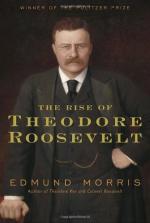|
This section contains 596 words (approx. 2 pages at 400 words per page) |

|
The Rise of Theodore Roosevelt Summary & Study Guide Description
The Rise of Theodore Roosevelt Summary & Study Guide includes comprehensive information and analysis to help you understand the book. This study guide contains the following sections:
This detailed literature summary also contains Topics for Discussion and a Free Quiz on The Rise of Theodore Roosevelt by Edmund Morris.
The Rise of Theodore Roosevelt skillfully catalogues the early years of the man who eventually becomes president.
Born in New York City to Mittie and Theodore Roosevelt, their second child and first son suffers from delicate health immediately. Theodore Senior responds to this with admonishment that his son pursue as vigorous a lifestyle as possible. Roosevelt rises to the challenge and, against doctors orders, strengthens his body with a variety of physical pursuits.
The young "Teddie" also possesses an early desire for learning, especially in reading various volumes of natural history in his father's vast library. This education inspires a lifelong desire for reading and writing in Theodore Roosevelt. After homeschooling by his Aunt Annie, Roosevelt enters Harvard at seventeen years of age.
In college, Roosevelt pursues a variety of subjects, first specializing in natural history before turning to law. While in school, he mourns the sudden death of his father. He also meets and falls in love with Alice Lee. Shortly after his graduation, the two marry.
Moving his new bride back to New York City, Roosevelt becomes involved in state politics. Many react in amazement when the young man becomes a state assemblyman and moves, part time, to Albany. He gains a reputation as a man who strikes down much legislation, without proposing much of his own.
During his second year in Albany, he receives news of the birth of his first child, a daughter. A second telegram brings the unhappy news that both his wife and mother lay ill. Roosevelt rushes home and sees both women die within hours of one another.
Distraught, Roosevelt travels west, where he often found solace in the past. The openness of the Dakotas heals him somewhat and he eventually returns to New York City to visit him daughter and his sister, Bamie. After twenty-two months, Roosevelt rekindles a romance with childhood sweetheart, Edith Carow. The two travel, secretly, to England to be wed.
Roosevelt's first national appointment comes from President Harrison, for the commissionership of civil service. In this office, Roosevelt travels the country seeking to prevent appointments based on connections rather than qualifications. His works gains him national recognition. However, he seeks work that is more rigorous and gains it, in the form of New York City Police Commissioner.
In New York City, Roosevelt seeks to rid the city of corrupt officials and mob-like organizations. He makes much progress, but still suffers from unpopular press. After some frustrating losses and opposition, he seeks, instead, an appointment from upcoming president, William McKinley.
Roosevelt travels the country to campaign for the housebound McKinley. McKinley rewards the efforts with an appointment as Assistant Secretary of the Navy. Once again, in Washington, Roosevelt begins to push for war with Spain, specifically in the Philippines and Cuba. Just one year after his appointment, Roosevelt resigns his post to enlist in the army and travel to Cuba.
Roosevelt's regiment, the Rough Riders, prove instrumental in the victory on San Juan Hill, which proves a key vantage point in the small, island country. Roosevelt soon returns to America, as a war hero. He immediately campaigns to be governor of New York. After a heated race, he succeeds.
For less than two years, Roosevelt serves as a controversial governor. However, the death of Hobart, the vice president, raises rumors of a new spot for Roosevelt in Washington. Though he claims no desire for the vice presidency, his appointment passes. Just months after taking office, President McKinley is assassinated, elevating Roosevelt to a position he coveted many times in his career.
Read more from the Study Guide
|
This section contains 596 words (approx. 2 pages at 400 words per page) |

|



